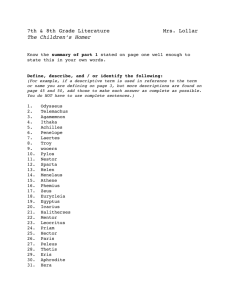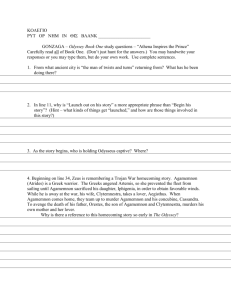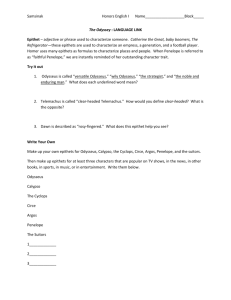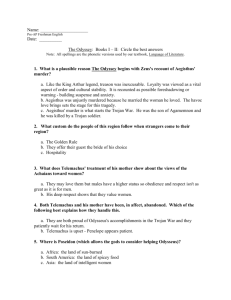Tutorial Discussion Questions
advertisement
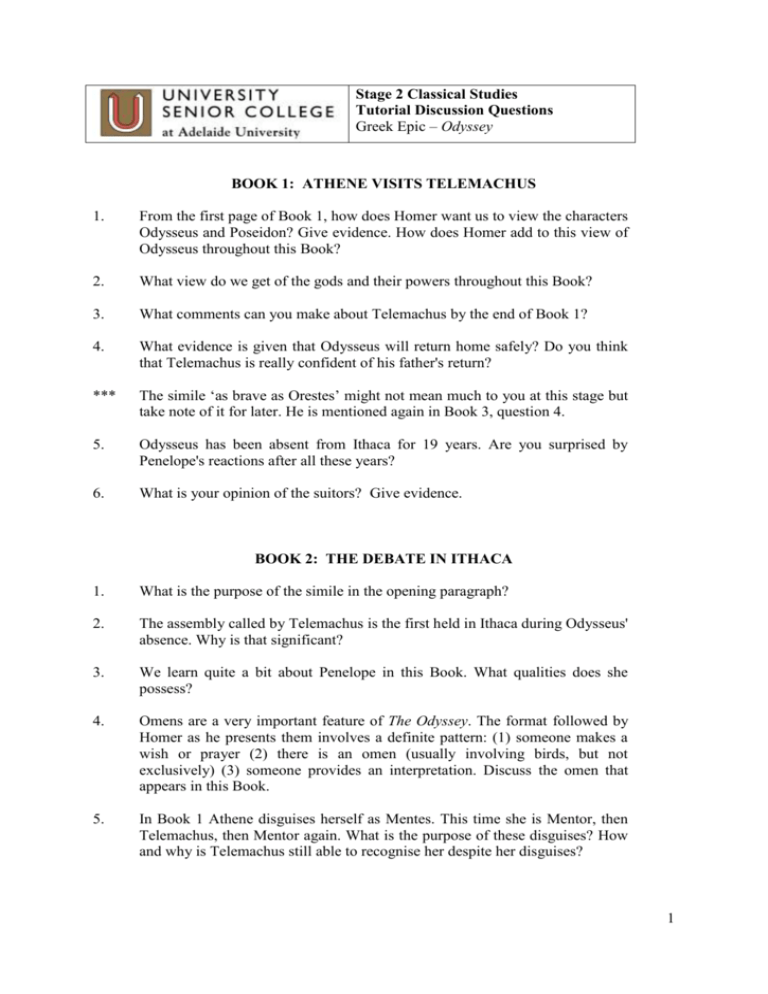
Stage 2 Classical Studies Tutorial Discussion Questions Greek Epic – Odyssey BOOK 1: ATHENE VISITS TELEMACHUS 1. From the first page of Book 1, how does Homer want us to view the characters Odysseus and Poseidon? Give evidence. How does Homer add to this view of Odysseus throughout this Book? 2. What view do we get of the gods and their powers throughout this Book? 3. What comments can you make about Telemachus by the end of Book 1? 4. What evidence is given that Odysseus will return home safely? Do you think that Telemachus is really confident of his father's return? *** The simile ‘as brave as Orestes’ might not mean much to you at this stage but take note of it for later. He is mentioned again in Book 3, question 4. 5. Odysseus has been absent from Ithaca for 19 years. Are you surprised by Penelope's reactions after all these years? 6. What is your opinion of the suitors? Give evidence. BOOK 2: THE DEBATE IN ITHACA 1. What is the purpose of the simile in the opening paragraph? 2. The assembly called by Telemachus is the first held in Ithaca during Odysseus' absence. Why is that significant? 3. We learn quite a bit about Penelope in this Book. What qualities does she possess? 4. Omens are a very important feature of The Odyssey. The format followed by Homer as he presents them involves a definite pattern: (1) someone makes a wish or prayer (2) there is an omen (usually involving birds, but not exclusively) (3) someone provides an interpretation. Discuss the omen that appears in this Book. 5. In Book 1 Athene disguises herself as Mentes. This time she is Mentor, then Telemachus, then Mentor again. What is the purpose of these disguises? How and why is Telemachus still able to recognise her despite her disguises? 1 BOOK 3: TELEMACHUS WITH NESTOR 1. How are the gods worshipped? 2. The treatment of visitors or guests is an important feature of this poem. Give an outline of how Telemachus is received by Nestor. 3. Nestor gives an account of the Battle of Troy. What role did Odysseus play in this battle? What does this tell us about Odysseus? 4. Telemachus is again compared with Orestes. How does Telemachus' situation compare with that of Orestes? 5. What do we learn of the way of life of the nobles? 6. Telemachus visited Nestor to learn news of his father. What does he actually find out about Odysseus? BOOK 4: MENELAUS AND HELEN 1. Again we learn of life in the palaces of the nobility. What additional information is given in this Book? 2. The image of Odysseus as a lion occurs frequently throughout the poem. We have the first example in this Book. Give your interpretation of the little story Menelaus told and comment on its significance. 3. What evidence is given of where Odysseus is and of his character? 4. What is your opinion of the suitors? Give evidence to support your view. 5. What is the purpose of Athene's disguised visit to Penelope? What is your reaction to Athene's news? 6. At this stage of the poem we have heard a great deal about Odysseus through other people, but we haven't met him for ourselves. Sum up your view of him so far. We will be discussing Books 1-2 in our first tutorial. 2
